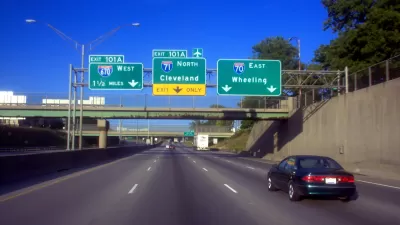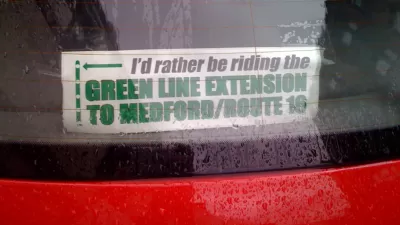Transportation bills are notorious for being chock full of earmarks, and with new attention being brought to curbing them, how will good policy get passed? A handful of experts are discussing the problem over at the National Journal.
Greg Cohen, President and CEO of the American Highway Users Alliance, says it is possible to curb earmarks:
"The prospect of an earmark-free bill could be exciting for transportation stakeholders in that passage of the bill would have to depend on the strength of the bill's policies, rather than the goodies in it for individual districts."
Phineas Baxandall, a Senior Analyst with U.S. PIRG, says that Cong. Jim Oberstar put new controls into effect that could make a difference this time around:
"Under Oberstar's watch, the Committee established rules requiring that earmarked projects have the support of local public officials, a plan for how to fully fund the project, information about the project's benefits, and proof that the member of Congress submitting the request will not benefit financially from the project."
The discussion continues over at the National Journal.
FULL STORY: For the Want of an Earmark

Planetizen Federal Action Tracker
A weekly monitor of how Trump’s orders and actions are impacting planners and planning in America.

Restaurant Patios Were a Pandemic Win — Why Were They so Hard to Keep?
Social distancing requirements and changes in travel patterns prompted cities to pilot new uses for street and sidewalk space. Then it got complicated.

Maui's Vacation Rental Debate Turns Ugly
Verbal attacks, misinformation campaigns and fistfights plague a high-stakes debate to convert thousands of vacation rentals into long-term housing.

Boulder Eliminates Parking Minimums Citywide
Officials estimate the cost of building a single underground parking space at up to $100,000.

Orange County, Florida Adopts Largest US “Sprawl Repair” Code
The ‘Orange Code’ seeks to rectify decades of sprawl-inducing, car-oriented development.

Maui's Vacation Rental Debate Turns Ugly
Verbal attacks, misinformation campaigns and fistfights plague a high-stakes debate to convert thousands of vacation rentals into long-term housing.
Urban Design for Planners 1: Software Tools
This six-course series explores essential urban design concepts using open source software and equips planners with the tools they need to participate fully in the urban design process.
Planning for Universal Design
Learn the tools for implementing Universal Design in planning regulations.
Heyer Gruel & Associates PA
JM Goldson LLC
Custer County Colorado
City of Camden Redevelopment Agency
City of Astoria
Transportation Research & Education Center (TREC) at Portland State University
Camden Redevelopment Agency
City of Claremont
Municipality of Princeton (NJ)





























